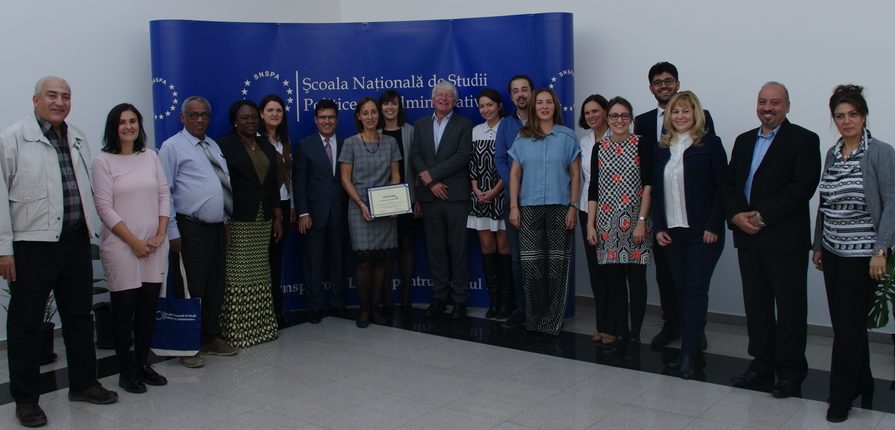Leaders from universities around the world are this week at the National University of Political Studies and Public Administration (SNSPA), in Romania, to take part in a unique five-day seminar aimed at exploring internationalization in higher education and what it means to be a globally engaged leader.
To support new and future leaders of Higher Education Institutions, the International Association of Universities (IAU) has developed a leadership programme. Launched in 2015, Leading Globally Engaged Universities (LGEU) is a unique leadership training programme that has been running twice a year, hosted by a different IAU Member institution each time. After Malaysia, Ireland, Colombia, Botswana and Canada, LGEU is taking place in Romania for its sixth edition.
Organized by the International Association of Universities (IAU) and hosted by at the National University of Political Studies and Public Administration (SNSPA) in Bucharest, on 14-19 October 2018, LGEU is bringing representatives from institutions in Afghanistan, Bangladesh, Egypt, France, Ghana, Ireland, Palestine, Romania, Republic of Moldova, Sudan who aim to strengthen their leadership skills, as well as to discuss opportunities, challenges and strategies related to global engagement in higher education.
LGEU is an inclusive programme whose participants are drawn from various backgrounds, ranging from Heads of Institution, to Vice-Presidents, Deans, but also Academic Department Heads, Registrars and CEO’s as well as senior professional service leaders.
“Around the world, one can find many leadership development programs addressing specific leadership issues of relevance locally and nationally. Yet, as shown through an IAU study on such program, there exists no program similar to LGEU. The aim is to debate Higher Education and set it in a global perspective yet looking as well at local implications. This program offers unique lifelong learning opportunity for higher education leaders. IAU is honored to be hosted by the prestigious university SNSPA.”, says Hilligje van’t Land, Secretary-General of IAU, who is co-leading the workshops with Tom Kennie, LGEU programme director and director of Ranmore Consulting Group.
Throughout the week, attendees will participate in leadership development exercises, sharing their own insights and institutional approaches to global engagement.
“There are many topics where university leadership faces similar dilemmas and the local realities and context matter when discussing policies and solutions. Universities have to look towards the future, with a new type of leadership, and to redefine their strategies for the coming years, focusing predominantly on improving quality, increasing the employability of students and setting new goals and plans for research. The IAU seminar is designed to support and assist higher education leaders, both academics and administrators, in responding creatively to these challenges. Our university is privileged to host this event”, says SNSPA rector, prof. dr. Remus Pricopie, Vice President of the International Association of Universities (IAU).
The International Association of Universities was founded under the aegis of UNESCO and brings together institutions and organizations from 130 countries, stimulates cooperation between them, discusses issues specific to the academic environment and proposes solutions, empowers experts, provides assistance in public policy development in the field of higher education and provides support members, decision-makers, teachers, researchers and students.
On this occasion, the university Senate rewarded IAU with the anniversary gold medal ‘SNSPA 25 plus 1’, for the contribution to the modernization of the international higher education.
Founded in 1950, under the auspices of UNESCO, to encourage cooperation among institutions of higher education worldwide, the International Association of Universities (IAU) brings together institutions and organizations from 130 countries, stimulates cooperation between them, discusses issues specific to the academic environment and proposes solutions, empowers experts, provides assistance in public policy development in the field of higher education and provides support members, decision-makers, teachers, researchers and students.



